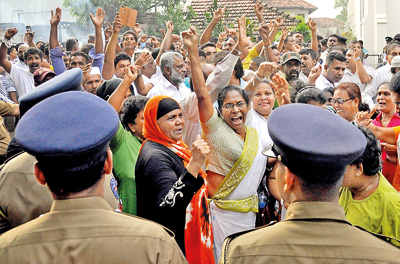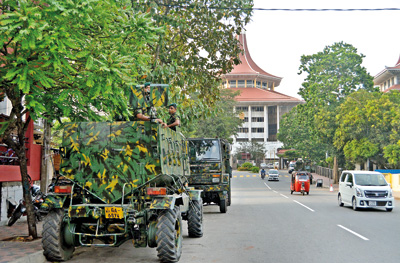News
Landmark judgment that ended constitutional crisis
With the words, “null, void ab initio and without force or effect in law,’ a seven member bench of the Supreme Court quashed the gazette notification issued by President Maithripala Sirisena on November 9, 2018 dissolving Parliament and thus bringing to an end a month- long landmark hearing before Court. The highly anticipated judgment was delivered to a packed courtroom by Chief Justice Nalin Perera PC on Thursday evening, exactly a month after the three-member bench of the Supreme Court granted interim relief to the petitioners who sought the suspension of the gazette notification issued by the President.

After the verdict: Scenes of jubilation outside the Supreme Court premises. Pix by Priyantha Wickramaarachchi and M.D. Nissanka
Five of the seven judges, namely Justices Buwaneka Aluwihare PC, Priyantha Jayawardena PC, Prasanna Jayawardena, Vijith K. Malalgoda PC, and Murdu Fernando PC agreed with the judgment delivered by the Chief Justice while Justice Sisira J de Abrew delivered a separate judgment but agreed with the conclusion reached by the Chief Justice.
The judgment of the Chief Justice ran into 88 pages, while Justice De Abrew s judgment ran into 20 pages, with the bench unanimously agreeing that under the Nineteenth Amendment to the Constitution enacted after President Sirisena took office in January 2015, the Executive has no power to dissolve the House before the lapse of four and a half years.
“By operation of the second paragraph of Article 70 (1), the President cannot dissolve Parliament during the first four and a half years of its term unless he has been requested to do so by a resolution passed by not less than two thirds of the Members of Parliament [including those not present],” and that it’s only after the expiry of this period that the “President is entitled, at his own discretion, to dissolve Parliament by issue of a Proclamation,” the CJ concluded.
Justice De Abrew, in his judgement, addressed the issue of the court’s jurisdiction to inquire into the legality and correctness of the Proclamation issued by the President of the Republic and concluded that the court has the jurisdiction to inquire into such a Proclamation issued by the President dissolving Parliament and that “proclamations are subject to the judicial review of this court and do not come under immunity stated in Article 35 of the Constitution.”

Heavy presence of STF personnel at the SC premises on Thursday (above and top)
Ten Fundamental rights petitions were filed in the Supreme Court challenging the President’s actions. Among the petitioners were Leader of the Tamil National Alliance (TNA) Rajavarothiam Sampanthan, UNP MPs Kabir Hashim and Akila Viraj Karawasam, MPs of the JVP, the Sri Lanka Muslim Congress, the All Ceylon Makkal Congress , MP Manoharan Ganesan, Lal Wijenayake of the United Left Front, the Centre for Policy Alternatives (Guarantee) Limited and Member of the Election Commission Professor S. Ratnajeevan H. Hoole. There were also five intervenient petitioners including Prof. G.L Pieris and MP . Udaya Prabath Gammanpila.
The Court upheld that it is the “ inalienable right of every citizen of our country to invoke the fundamental rights jurisdiction of the Supreme Court as a cornerstone of the sovereignty of the people which is the Grundnorm of our Constitution.” And that the fundamental rights of the petitioners guaranteed under Article 12 (1) of the Constitution have been violated by the issue of the Proclamation.
(See full judgement on www.sundaytimes.lk)
http://www.supremecourt.lk/images/documents/sc_fr_351_2018_contd.pdf
http://www.supremecourt.lk/images/documents/sc_fr_351_2018.pdf


